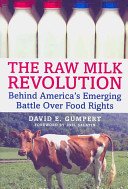 The Raw Milk Revolution: Behind America's Emerging Battle Over Food Rights, by David E. Gumpert (Chelsea Green Publishing, White River Junction, Vermont, 2009)
The Raw Milk Revolution: Behind America's Emerging Battle Over Food Rights, by David E. Gumpert (Chelsea Green Publishing, White River Junction, Vermont, 2009)
That the forward to The Raw Milk Revolution was written by Joel Salatin—whose Polyface Farms is the poster child for independent, sustainable farming—gives the reader a good idea of where the book ends up. That's a lot more than the author knew when he began his investigation. He was over 50 when he had his first glass of raw milk, and hadn't given milk of any form much thought for some 30 years.
But for a writer with interests in both small businesses and health, the growing demand for unpasteurized, unhomogenized milk—and the increasing governmental interference with the small dairy farms that are its only source—was a natural field to investigate.
I had my first glass of raw milk at lunch, with a homemade chocolate chip cookie.... Suddenly I was back in my childhood, with my all-time favorite snack. The milk was as creamy and rich tasting as it looked, with a slight sweetness I didn't recall from my childhood milk. ... But I'd be lying if I didn't admit that overhanging the experience was an anxiety-laden question provoked by my American history classes highlighting the importance of pasteurization in saving lives: Might this wonderful milk kill me? I actually went to sleep wondering whether I'd wake up. ... Of course, there was no bad reaction of any sort, and I became a regular customer.
Gumpert is lucky. The places one can legally purchase raw milk are few. In Switzerland Janet lives an easy walk from a local dairy, where she can buy all she wants at a good price. Pennsylvania is one of the few states in the U.S. where raw milk is legal, and Heather can get some for the cost of a long drive and a lot more money than the grocery store charges for their agri-business milk. In Florida we can't buy it legally at any price, except as (very expensive) pet milk, "not for human consumption."
In most places one can still drink the milk from one's own cows (though even that right is in danger), and some farmers have set up "cow share" programs in which the customers actually own a share of the cow and are thus entitled to a percentage of her milk; the farmer's role is caretaker, not owner. This neat little device reminds me of the old days of homeschooling, where families would incorporate as private schools and thus satisfy the law requiring either public or private schooling. The legality of that arrangement for homeschoolers was in many cases questioned, and such is now the case with raw milk cow shares. Worse, really, because education is still very much a local and state concern, but the federal government is putting its muscle behind the campaign against raw milk.
Gumpert does a good job of analyzing the supposed risks versus the supposed benefits of raw milk, while exposing the strong-arm tactics and illogical reasoning being used against small dairies. He has clearly become a raw milk devotee; however, his concern is not simply about milk, but about similar threats to small farmers and the local/natural/sustainable agriculture movement in general.
A month ago, CNN published an article which used the completely unrelated E. coli outbreak in Europe to call for a total ban on raw milk and juice. The Raw Milk Revolution is an excellent refutation of the scare tactics. But here's an interesting quote from the article:
Consuming a diet loaded with fat and salt is unhealthy, but the government has no business regulating that. Raw milk, however, is different.
Really? Why? How is raw milk different? Well, for one thing, the risks associated with raw milk are probably less than the risks of the kind of diet he would keep far away from governmental regulation (as would I). Even if you exclude the long-term, less-quantifiable risks of heart disease, a study reported in The Raw Milk Revolution showed that for listeria, a disease of concern with raw milk, the per-serving risk is ten times greater with deli meat. I don't hear anyone calling for a ban on Subway. (Nor would I; it's my second-favorite fast food restaurant, after Chick-Fil-A.)
I'm not saying the government doesn't have an important role when it comes to food safety. Inspection and certification can provide necessary information that consumers don't always have access to on their own. I'm in favor of state certification of dairies for raw milk—as long as the requirements are reasonable and take into account the great differences between small-scale production and factory farming. (Full disclosure: my great-grandfather, Willis Langdon (1854-1932), was one of the first dairy farmers in the State of Washington to offer certified milk to his customers.)
If you wonder why raw milk enthusiasts are so passionate about the issue, or if you'd like to try raw milk but, like the author at the beginning of his quest, wonder if it will kill you in your sleep, or if you're even thinking about supporting a ban on unpasteurized foods, The Raw Milk Revolution is a great resource for intelligent decision-making.
And anyone who wants to try raw milk is welcome to come visit us in Switzerland! I love waving to the friendly farmers as I pass by on my runs with Joseph or when I come to fill up our milk pail. It might be lonely here so far from family, but there are some great advantages to living in Europe! Hurray for local raw milk!
The Front Porch Republic weighs in with this somewhat curmudgeonly, but interesting, article.


